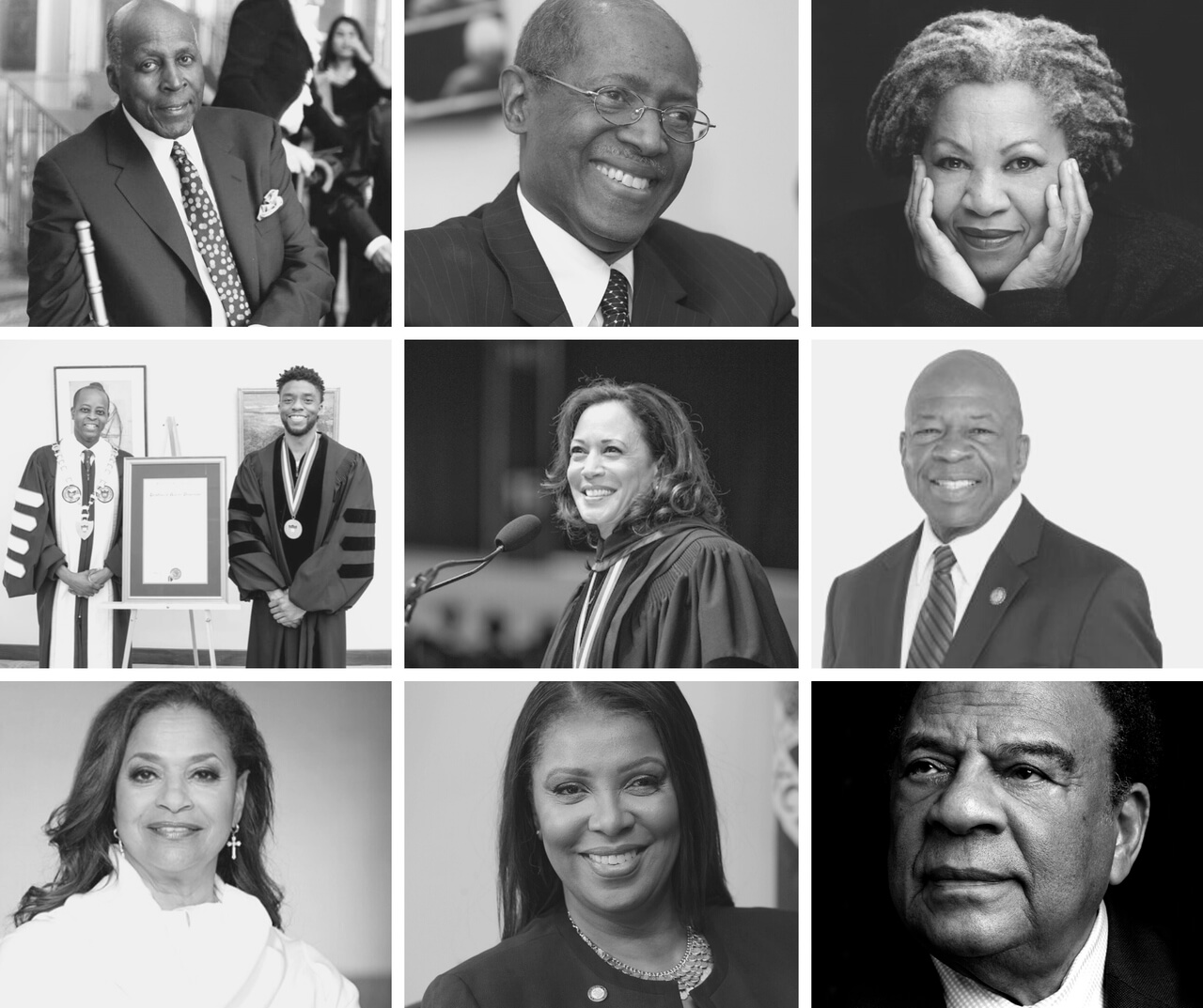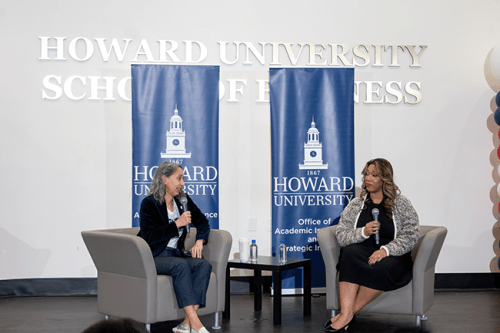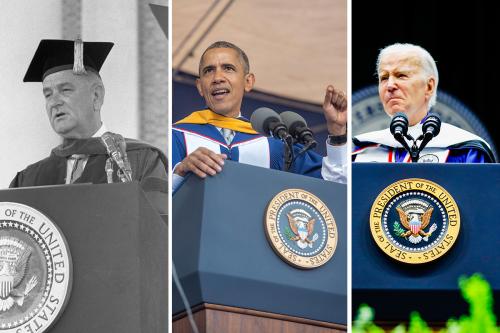 WASHINGTON – From civil rights leaders and famous entertainers to award-winning journalists and Fortune 500 executives, a Howard University education has been the pathway to success for some of the world’s most accomplished figures nationally and abroad. In 2020, Howard University added Kamala Harris’ election as vice president of the United States to its extensive list of history-making alumni accomplishments. As the vice president-elect prepares to be sworn in on Inauguration Day, the Howard University community shared their reflections on what it means for a Howard alumna to take her seat as the next vice president.
WASHINGTON – From civil rights leaders and famous entertainers to award-winning journalists and Fortune 500 executives, a Howard University education has been the pathway to success for some of the world’s most accomplished figures nationally and abroad. In 2020, Howard University added Kamala Harris’ election as vice president of the United States to its extensive list of history-making alumni accomplishments. As the vice president-elect prepares to be sworn in on Inauguration Day, the Howard University community shared their reflections on what it means for a Howard alumna to take her seat as the next vice president.
“We stand on the shoulders of so many giants who came before us making history,” said Sharon Strange Lewis (B.A., ‘84), director of alumni relations at Howard University. “When you think about some of the African-American leaders in politics who changed the world, and you ask where they come from, so many of them came from Howard University.”
A Howard alumna herself, Strange Lewis came to Howard being inspired by civil rights leaders Vernon Jordan (J.D., ‘60) and Andrew Young (B.S., ‘51). Jordan, who earned a degree from the Howard University School of Law, is a widely revered civil rights advocate. Young, another historic figure, was a pastor and voting rights advocate who became a trusted adviser and confidante to Martin Luther King Jr. and served as executive director of the Southern Christian Leadership Conference (SCLC). He also held multiple positions in government, including a tour as a member of Congress and U.S. ambassador to the United Nations.
These leaders represent the best of the Howard University tenets of excellence in truth and service. Another Howard alum, prize-winning author Toni Morrison (B.A. ‘53), who is also a member of Alpha Kappa Alpha Sorority, Inc. like Harris, made her mark in history telling the stories of Black American life in a way that was radically honest and uncompromising. Whether through grassroots organizing, through the law or through their art, Howard alumni demonstrate a commitment to the pursuit of a racially just and equitable society and laid the groundwork for others to follow.
Willie-Lloyd Reeves (B.A. ‘71, J.D. ‘74), a two-time Howard alumnus and co-chair of Howard University’s 50th class reunion, remembers what it was like to attend Howard University during the civil rights movement.
“I came to Howard from Portsmouth, Va.,” said Reeves. “I was originally interested in drama – Debbie Allen was in my class, and we both became members of the Howard Players. I was excited to come to Howard just as the civil rights movement was ending and the Black power movement was emerging. We had excellent professors who made sure we understood the political process, the Constitution and how politics played an important role during that era.”
While on campus, Reeves became a member of the alpha chapter of Omega Si Phi Fraternity, Inc. As a member of the fraternity, Reeves says Harris’ election to the executive office holds special significance for him.
“I was elated. Not only is she an alumna, but she is also a member of the divine nine. We had that bond,” Reeves continued. “It’s exciting, and I’m proud to support someone from our Alma Mater that reached that height. We’ve of course had outstanding alumni from Howard, but now we have the first African-American, first South Asian and first woman to hold that position of vice president.”
If it weren’t enough for Harris to be elected vice president, becoming the first African-American and South Asian American woman to climb the ranks of power, breaking through the socio-political barriers of race and gender and being the daughter of immigrants along the way, speaks volumes. Harris is among other contemporary figures who continue raising the bar for Howard’s legacy. Take, for example, Howard alumna Letitia James who became the first African-American and first woman to be elected as New York attorney general in 2019.
“I always say your degree is your currency, and our currency just increased in value,” said Charlie Lewis (B.B.A. ‘89), president of the Howard University Alumni Association. “Howard has always been on the forefront in the business, entertainment and political world, but now others can see that Howard is filling the gap of Black leaders with Harris at the top of that ticket. To me, it takes the age-old criticism of ‘what does going to an HBCU do for you?’ out of the equation.”
Lewis spoke to the culture shift that happens with so many HBCU alumni taking prominence in today’s high-stakes political events. He referenced Stacey Abrams, a graduate of Spelman College, who led mass voter mobilization efforts during Georgia’s Senate race. As a result of these and other efforts, Raphael Warnock, a Morehouse College alumnus, was elected as Georgia’s first Black senator. And on Jan. 20, the world will watch as Harris, a Howard alumna, becomes our country’s second in command.
“Vice President-elect Kamala Harris, Sen. Raphael Warnock, Atlanta Mayor Keisha Lance Bottoms and Stacey Abrams, these are our new generation’s Black leaders,” Lewis continued.
Gabrielle Gray, Ph.D. (‘20), a recent graduate of the Department of Political Science and a member of Alpha Kappa Alpha Sorority, Inc., said Harris represents Howard’s legacy of producing Black excellence since its founding in 1867. For Gray, Harris’ election brings her hope that society is shifting away from the white status quo and affirms the role of Black institutions.
“She is an example of how success does not require detachment from Black institutions or assimilation into white America. Harris’ election has given me a renewed faith in our democracy, knowing that it is taking a turn, although with pushback, towards an America that is starting to live in the values it was founded on.”
###
About Howard University
Founded in 1867, Howard University is a private, research university that is comprised of 13 schools and colleges. Students pursue studies in more than 120 areas leading to undergraduate, graduate and professional degrees. The University operates with a commitment to Excellence in Truth and Service and has produced one Schwarzman Scholar, three Marshall Scholars, four Rhodes Scholars, 11 Truman Scholars, 25 Pickering Fellows and more than 165 Fulbright recipients. Howard also produces more on-campus African-American Ph.D. recipients than any other university in the United States. For more information on Howard University, visit www.howard.edu.
Media Contact: Misha Cornelius, misha.cornelius@howard.edu




